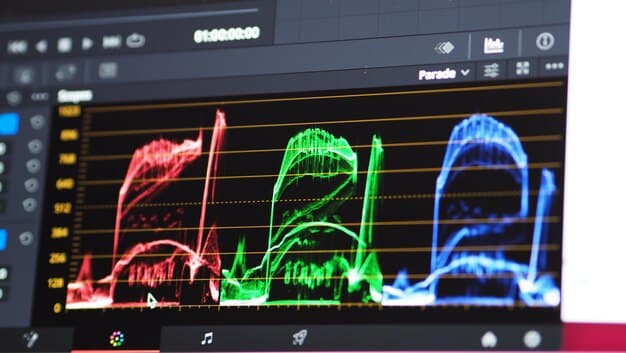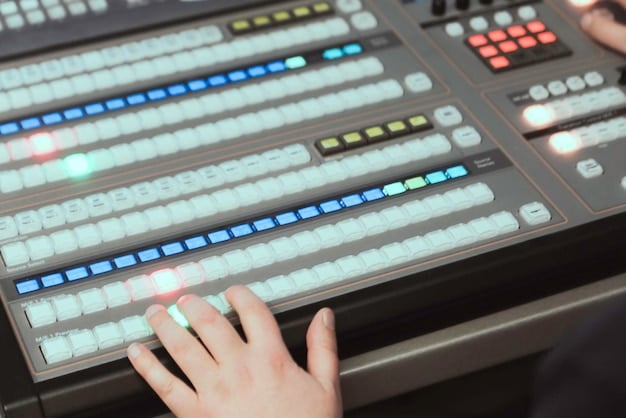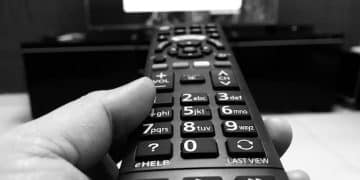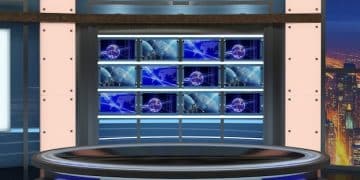Reality TV’s Editing Tricks: How Editing Creates Drama

Reality TV’s editing tricks involve producers using various techniques like selective editing, misleading sound, and manufactured drama to manipulate storylines and create heightened emotions for viewers.
Have you ever wondered how reality TV shows manage to create so much drama? The secret often lies in the editing room. Reality TV’s editing tricks are a powerful tool used by producers to manipulate storylines, create conflict, and ultimately shape our perception of the show and its participants.
The Power of Selective Editing in Reality TV
Selective editing is perhaps the most fundamental of reality TV editing tricks. It involves choosing specific moments and soundbites from hours of footage to construct a narrative that may not accurately reflect the actual events.
Producers carefully sift through the footage, cherry-picking the most sensational, controversial, or emotional moments to create a compelling storyline. This can lead to a distorted portrayal of the participants and the events that transpired.
How Selective Editing Changes the Narrative
Imagine a scenario where a contestant makes several positive and helpful comments throughout an episode. Yet, the editors choose to focus on a single negative remark, amplifying it to portray the contestant as a villain. This is the power of selective editing.
By strategically selecting what viewers see and hear, producers can create a narrative that suits their desired storyline, regardless of whether it is an accurate representation of reality.

Examples of Selective Editing in Popular Shows
Many popular reality shows have been accused of using selective editing to create drama and manipulate storylines. For example, in competitive reality shows, contestants may be portrayed as overly competitive or even cutthroat through the careful selection of footage that emphasizes their ambition and aggression.
- “The Bachelor/Bachelorette”: Editing can showcase only the most romantic or dramatic interactions, omitting mundane moments to heighten the sense of passion or conflict.
- “Survivor”: Strategic alliances and betrayals can be emphasized by editing together specific conversations and reactions, creating a compelling narrative of deception and manipulation.
- “Real Housewives” franchises: Conflicts between cast members can be amplified by focusing on their most heated exchanges, while downplaying moments of camaraderie or reconciliation.
Selective editing is a pervasive technique that shapes our perception of reality TV. By being aware of this technique, viewers can develop a more critical eye and question the narratives presented on screen.
Misleading Sound and Music in Reality TV Editing
Sound and music play a critical role in shaping the emotional impact of reality TV. Editors use a variety of audio techniques to manipulate viewers’ perceptions and enhance the drama of a scene.
By carefully selecting and manipulating sound effects, music, and voiceovers, producers can influence how viewers interpret the events unfolding on screen. These reality TV editing tricks are incredibly effective.
The Role of Music in Enhancing Drama
Music is a powerful tool for creating specific moods and emotions. Reality TV shows often use dramatic music cues to heighten tension, suspense, or excitement. These music cues are carefully chosen to match the action on screen and amplify its emotional impact.
For example, a tense confrontation between two contestants might be accompanied by ominous music to create a sense of impending conflict. A romantic moment might be underscored by soft, sentimental music to enhance the feeling of intimacy.
Using Sound Effects to Manipulate Emotions
Sound effects can also be used to manipulate viewers’ emotions. The addition of subtle sound effects, such as gasps, sighs, or whispers, can heighten the drama of a scene and create a sense of unease or anticipation.
Editors may also use sound effects to emphasize specific actions or reactions. For example, a door slamming shut might be accompanied by a loud, jarring sound effect to emphasize the anger or frustration of the person slamming the door.

Voiceovers and Their Impact on Storytelling
Voiceovers are a common technique used in reality TV to provide commentary, explain events, or offer insights into the participants’ thoughts and feelings. This is one of the common reality TV editing tricks used. However, voiceovers can also be used to manipulate viewers’ perceptions and shape the narrative.
By carefully crafting voiceover narration, producers can guide viewers’ interpretations of events and influence their opinions of the participants. A seemingly innocuous comment can be given a sinister edge through the addition of a carefully worded voiceover.
The strategic use of sound and music is crucial for creating the desired emotional impact in reality TV. By being aware of these techniques, viewers can better understand how their emotions are being manipulated and develop a more critical perspective on the shows they watch.
Creating Conflict Where None Exists: Manufactured Drama
One of the more controversial reality TV editing tricks is manufactured drama. Producers and editors sometimes create conflict where little or none existed by manipulating the footage, sound, and editing to portray situations and interactions in a more dramatic light.
This can involve editing together segments from different times or contexts to create the illusion of a heated argument or intensifying minor disagreements into major conflicts.
Techniques for Manufacturing Drama
Several techniques are used to manufacture drama in reality TV. One common method involves editing together snippets of conversations from different times and contexts to create the illusion of a continuous argument. This can make it appear as if the contestants are constantly at odds, even if they are actually getting along most of the time.
Another technique involves focusing on the most negative or controversial moments, while downplaying any positive interactions or conciliatory gestures. This can create a distorted portrayal of the participants and their relationships.
The Ethical Implications of Manufactured Drama
The use of manufactured drama raises serious ethical concerns. By manipulating the footage and creating false narratives, producers are essentially deceiving viewers and exploiting the participants for entertainment value.
This can have serious consequences for the participants, who may be subjected to public ridicule or harassment as a result of their portrayal on the show. It can also damage their reputations and relationships.
- Damaging Reputations: Participants can be unfairly portrayed as villains, leading to long-term reputational damage.
- Psychological Impact: The stress of being misrepresented and facing public scrutiny can have significant psychological effects.
- Erosion of Trust: Viewers may become cynical and distrustful of reality TV, diminishing its entertainment value.
Manufactured drama is a manipulative tactic that undermines the integrity of reality TV and has potentially harmful consequences for the participants. Viewers should be aware of this technique and view reality shows with a healthy dose of skepticism.
The Impact on Contestants: When Reality Bites Back
While reality TV can offer contestants a platform for fame and opportunity, the effects of deceptive editing and manufactured drama can have a profound impact on their lives.
The way a contestant is portrayed can lead to significant personal and professional repercussions long after the show has aired.
Mental Health Challenges
Being misrepresented on television can take a significant toll on a contestant’s mental health. The stress of being portrayed negatively to a large audience can lead to anxiety, depression, and other mental health issues.
Contestants may also struggle with feelings of shame, embarrassment, or anger as a result of their portrayal on the show. They may feel betrayed by the producers and editors who manipulated the footage to create a false narrative.
The Social Media Backlash
In the age of social media, reality TV contestants are often subjected to intense scrutiny and criticism from viewers. The negative portrayal of a contestant on a show can lead to a barrage of hateful comments, insults, and even threats on social media.
This can be incredibly damaging to a contestant’s self-esteem and mental well-being. It can also make it difficult for them to move on with their lives after the show has aired.
Long-Term Professional Consequences
The way a contestant is portrayed on reality TV can also have long-term professional consequences. A negative portrayal can make it difficult for them to find work, pursue business opportunities, or maintain a positive public image.
Employers may be hesitant to hire someone who has been portrayed as a villain or a troublemaker on reality TV. Business partners may be reluctant to work with someone who has a damaged reputation. The impact of reality TV can extend far beyond the screen.
The potential consequences for contestants are significant, highlighting the need for ethical production practices and greater awareness among viewers.
Recognizing Editing Tricks: Becoming a Savvy Viewer
Given the prevalence of editing tricks in reality TV, it is essential for viewers to develop a critical eye and recognize the techniques used to manipulate storylines and create drama.
By becoming a savvy viewer, you can better understand how reality TV shows are constructed and avoid being unduly influenced by their narratives.
Look for Inconsistencies
One way to spot editing tricks is to look for inconsistencies in the footage. Pay attention to changes in clothing, hairstyles, or background details that don’t match up. These inconsistencies can be a sign that the footage has been edited together from different times and contexts.
Also, be aware of abrupt cuts or transitions that seem out of place. These can indicate that segments of the conversation have been removed or reordered to create a different impression.
Pay Attention to Sound and Music
As mentioned earlier, sound and music play a crucial role in shaping the emotional impact of reality TV. Pay attention to the music cues and sound effects used in the show. Are they being used to heighten tension, create suspense, or evoke other specific emotions?
Also, listen carefully to the voiceover narration. Is it providing objective commentary, or is it subtly guiding your interpretation of events? Be aware of how sound and music are being used to manipulate your emotions.
Consider the Context
When watching reality TV, it is important to consider the context of the events being portrayed. Remember that you are only seeing a small fraction of the footage that was actually filmed. There may be important details or nuances that are being omitted.
Also, be aware of the producers’ agenda. What are they trying to accomplish with the show? Are they trying to entertain, inform, or provoke a reaction? Understanding the producers’ goals can help you interpret the show’s narrative more critically.
- Research the Show: Look for behind-the-scenes information or interviews that might reveal production techniques.
- Read Online Forums: Discuss the show with other viewers to gain different perspectives and insights.
- Be Skeptical: Always question the narrative being presented and consider alternative interpretations.
By developing a critical eye and recognizing the editing tricks used in reality TV, you can become a more informed and discerning viewer.
The Future of Reality TV: Ethics and Transparency
As awareness of editing tricks and their impact on contestants grows, there is increasing pressure on reality TV producers to adopt more ethical and transparent practices.
The future of reality TV may depend on the industry’s willingness to prioritize fairness, accuracy, and respect for the participants.
Calls for Ethical Guidelines
Many critics and advocacy groups are calling for the establishment of ethical guidelines for reality TV production. These guidelines would aim to protect the rights and well-being of contestants and ensure that shows are produced in a fair and responsible manner.
Such guidelines might include provisions for informed consent, mental health support, and limitations on the use of deceptive editing techniques. They might also require producers to be more transparent about their goals and methods.
Increased Transparency in Editing
Some reality TV shows are already experimenting with increased transparency in editing. This can involve showing behind-the-scenes footage or providing commentary on the editing process.
By giving viewers a glimpse into the editing room, these shows aim to demystify the process and demonstrate that they are committed to presenting a fair and accurate portrayal of events. This increased transparency can help to build trust with viewers and restore credibility to the reality TV genre.
The Role of Viewers in Promoting Change
Ultimately, the future of reality TV will depend on the choices made by viewers. By demanding more ethical and transparent practices, viewers can send a powerful message to producers and networks.
By supporting shows that prioritize fairness and accuracy, and by boycotting shows that rely on manipulation and exploitation, viewers can shape the future of the reality TV landscape.
The demand for more ethical practices and greater transparency will drive positive change in the industry and ensure a more sustainable future for the genre.
| Key Point | Brief Description |
|---|---|
| 🎬 Selective Editing | Choosing specific moments to alter narratives. |
| 🔊 Sound Manipulation | Using music and sound effects to influence emotions. |
| 🎭 Manufactured Drama | Creating conflict through editing and staging. |
| 🛡️ Ethical Concerns | Questions arise about fairness and contestant well-being. |
FAQ Section
▼
Selective editing in reality TV involves choosing specific moments and soundbites from hours of footage to construct a narrative. This allows producers to manipulate the storyline and create heightened drama by focusing on particular events and actions.
▼
Sound manipulation in reality TV uses music, sound effects, and voiceovers to influence viewers’ emotions and perceptions. By carefully selecting and manipulating these elements, producers can create tension, suspense, or excitement, shaping how viewers interpret events.
▼
Manufactured drama in reality TV refers to creating conflict where little or none existed by manipulating the footage, sound, and editing. Producers may edit together segments, intensifying minor disagreements into major conflicts for entertainment value, potentially deceiving viewers.
▼
The ethical concerns include deceiving viewers, exploiting participants, and damaging reputations. By manipulating footage and creating false narratives, producers face criticism for the psychological impact on contestants and the erosion of trust in reality TV.
▼
Viewers can spot editing tricks by looking for inconsistencies, changes in clothing, and abrupt transitions. Paying attention to sound, music, and considering the context are other ways to recognize manipulation, allowing for a more critical perspective on reality TV.
Conclusion
Understanding the reality TV editing tricks used by producers is crucial for becoming a more informed viewer. By recognizing techniques like selective editing, sound manipulation, and manufactured drama, we can critically assess the narratives presented and appreciate the entertainment value without being unduly influenced by manipulated storylines.





